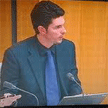Senator Scott Ludlam – jobs, economics, national aspects of Nuclear Royal Commission’s findings
 SENATOR SCOTT LUDLAM AUSTRALIAN GREENS SENATOR FOR WESTERN AUSTRALIA – Response to the Tentative Findings of the South Australian Nuclear Fuel Cycle Royal Commission
SENATOR SCOTT LUDLAM AUSTRALIAN GREENS SENATOR FOR WESTERN AUSTRALIA – Response to the Tentative Findings of the South Australian Nuclear Fuel Cycle Royal Commission
“………I would like to point to some research conducted by the Climate Institute that was done in collaboration with Ernst and Young and identifies that there is potential in South Australia to produce enough renewable energy to power 3,000,000 homes, remove pollution equivalent to 450,000 cars, and create close to 5,000 new jobs.
The report suggests that if a renewable energy industry were pursued there could be the creation of 5,178 new jobs including 1,300 permanent ongoing jobs, 2,688 jobs during construction and over 1,189 jobs in manufacturing.
It was very encouraging in December 2015 to see the South Australian Government release the “Low Carbon Investment Plan for South Australia” which looked at a $10 billion investment in low carbon energy – with the hope that by 2025 renewable energy would power 50% of South Australia and 100% by 2050ii . It seems that South Australia is making leaps and bounds, even without this significant investment. It was also encouraging to hear Premier Jay Weatherill’s commitment to renewable energy at the Paris climate summit. Being at the cutting edge of renewable energy technology suits South Australia. I welcome the commitment, enthusiasm and the exciting opportunities this presents to the state……..
While we welcome the preliminary finding that there are no prospects for nuclear power it is disturbing the preliminary findings ignore many serious and ongoing issues with the industry. While the economics are a clear barrier to nuclear power there are a range of safety issues that should be considered as well as suite of safeguards and proliferation considerations that do not appear to have been addressed by the NFCRC……..The world’s only deep geological repository that contains waste is the Waste Isolation Pilot Plant in New Mexico, USA. The Onkalo facility in Finland has been in the pipeline since 1983, and the total expected costs for the waste disposal is upward ofAUD $4.4 billion. The Sure facility in France is still under construction but earlier this year there was a collapse in the tunnel killing one worker and injuring and trapping another.
The WIPP facility, designed to contain radioactive waste for 10,000 years had a major radiological incident due to a chemical explosion within the first decade. 21 individuals received low level internal contamination; and there was a measurable leak of waste from the site discharged directly into the environment. The trial facility cost $19 billion to establish and will cost another half a billion to clean up after the 2014 radiation leak. The facility is still closed as the clean-up continues two years later.The preliminary findings of the NFCRC make no mention of the issues at WIPP or other facilities. This lack of consideration of real examples of waste management failures is a clear diversion from the fact based premise of the Royal Commission.Consideration of deep borehole waste storage also relies on optimism rather than evidence. There is no operating or trial deep borehole waste storage globally. There is one proposed trial in the US that will not be using radioactive waste.
The economic scenario put forward by Senator Sean Edwards to take International waste has been heavily criticised. Some of the issues with the Senator Edwards proposal identified by leading Australian economists include:• There is no plan for the management o fthe 56,000 tonnes of waste out of the 60,000 tonnes of waste proposed to be imported.
• There is no plausible case for the suggestion that another country would pay Australia US $lmillion per tonne to dispose of waste
- The proposal to convert nuclear waste into fuel for PRISM reactors is not warranted given that PRISM reactors don’t exist, and trials of PRISM reactors have been abandoned due to unacceptable risks
Over the last 30 years Australia has failed to come up with an acceptable solution for managing our own nuclear waste. The proposal to store international radioactive waste relies on Australia doing what other countries have failed to do since the inception of the industrial nuclear industry.
This issue is not just an issue for South Australia but has relevance for all Australians and for people globally. http://nuclearrc.sa.gov.au/app/uploads/2016/04/Ludlam-Scott.pdf
No comments yet.


Leave a comment